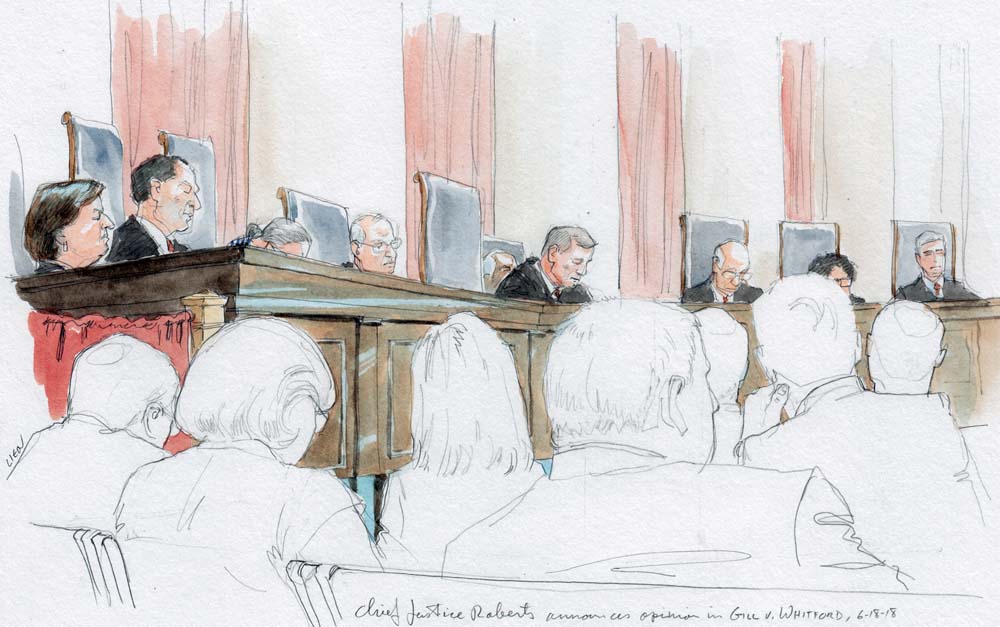A “view” from the courtroom: Down to the last few matches

on Jun 18, 2018 at 3:19 pm

Extreme heat has descended on Washington, and outside the Supreme Court building there is a long line of tourists and others seeking seats to the courtroom, or perhaps just entry into the building and its hearty air conditioning.
Earlier this morning, a friend spotted Justice Neil Gorsuch arriving for work and being let out of an SUV in the company of a small dog. The justice and the dog got out in front of the Library of Congress’ Jefferson Building on First Street Northeast, evidently to allow for a short “constitutional” walk to the court building.
Today is the last time this term there will be courtroom admissions to the Supreme Court Bar, and groups of lawyers to be admitted are again overflowing into the public gallery. The groups come from the U.S. Department of Justice, Georgetown University Law Center, and the Worcester Polytechnic Institute in Worcester, Mass. WPI does not appear to have a law school, so this group of alumni being sworn into the bar today must have received their law degrees elsewhere.
The bar admittees will be sworn in at the end of today’s session by Clerk of the Court Scott Harris, who is wrapping up a term that includes last fall’s introduction of electronic filing of briefs in paid cases. The change has widely been considered a success.
Ten o’clock arrives and the justices are running a little late. Perhaps they have been glued to the World Cup soccer match between Sweden and South Korea this morning. (We wonder whether any justice would request to be kept apprised on the bench of World Cup scores, the way some justices used to receive notes from their law clerks about important baseball scores during afternoon arguments.)
When the justices do take the bench at nearly two minutes past ten, it is the first full bench in a couple of weeks.
Justice Anthony Kennedy has returned after missing both of last week’s opinion days. It turns out that he was in New York City celebrating graduations of a grandchild of his on each of those days. At the Packer School in Brooklyn, according to parents who tweeted about the appearance, Kennedy was the speaker and referred to several countries where democracy is struggling, saying that the world is watching to see whether America’s freedom is working.
Kennedy even made it into the pages of the New York Post, a newspaper founded by Alexander Hamilton, the subject of the justice’s favorite hip-hop musical. The paper referred to Kennedy as “the judge” and quoted a witness who saw the justice and his family entourage at a celebratory meal in the Williamsburg section of Brooklyn as saying, “Judge Kennedy even stood up during his meal to compliment the live jazz band playing, and got their contact information for a soiree later this summer.”
Before any summer soirees, the justices still have business to finish. Chief Justice John Roberts announces that Justice Sonia Sotomayor has the opinion in Rosales-Mireles v. United States. Sotomayor removes her glasses to read a brief summary of the decision, which holds that a miscalculation of the U.S. sentencing guidelines that is plain and affects a defendant’s substantial rights calls for a federal appeals court to exercise its discretion under the Federal Rules of Criminal Procedure and vacate the sentence in the ordinary case.
The court has determined that petitioner Florencio Rosales-Mireles’ case is such an ordinary case, and that failing to correct an error in his sentencing will “seriously affect the fairness, integrity, and public reputation of judicial proceedings.”
Justice Clarence Thomas has filed a dissent, joined by Justice Samuel Alito.
Justice Stephen Breyer is up next with another sentencing guidelines opinion, in Chavez-Meza v. United States. The decision is about how much explaining a sentencing judge must provide when lowering the sentence of a convicted criminal who applied for a reduction based on changes in the guidelines.
Breyer stumbles over the word “methamphetamine” from his opinion, saying “meta-phetime.” In explaining that the court is rejecting Chavez-Meza’s argument that judges must say more when the reduced sentence was not “proportionate” to the old one, Breyer says, “We are not aware of any such legal requirement, and given the logarithmic nature of the guidelines’ sentencing table, we believe many judges in many contexts would be hard pressed to know just what ‘disproportionate’ means.”
He adds, as an aside, “Or maybe, like me, what ‘logarithmic’ means,” and gets a laugh.
Kennedy has filed a dissent, joined by Sotomayor and Justice Elena Kagan. Gorsuch took no part in the case.
Chavez-Meza was the case in which the government’s side was argued in April by Deputy Attorney General Rod Rosenstein. The word “logarithmic” was not uttered during the argument. In case Rosenstein is too busy to be looking for the outcome online, one of the 40 or 50 Justice Department lawyers in attendance today will surely inform him that he won.
Kennedy is next with Lozman v. City of Riviera Beach, Florida, a ruling breathlessly awaited by hosts of Supreme Court podcasts all over the world. This case involves petitioner Fane Lozman, who sued his Florida city for First Amendment retaliation after his 2006 arrest at a city council meeting.
Kennedy explains that Lozman’s case addresses the intersection of principles that define lawful arrests and principles that prohibit the government from retaliating against a person for exercising his right to free speech. But he quickly notes that Lozman did not sue the officer who arrested him, but the city, and there is a presumption that the officer acted with probable cause.
The question of whether a retaliatory arrest must be governed by one line of the Supreme Court’s precedents or another “must await a different case,” Kennedy says. Instead, the court holds that the existence of probable cause does not bar Lozman’s First Amendment retaliation claim under the circumstances of his case, and it remands the case for further proceedings.
Thomas has filed a dissent.
The chief justice announces that “I have the opinion in Number 16-1161, Gill v. Whitford.” The political-gerrymandering case from Wisconsin is the oldest pending case of the term and was considered potentially one of the most consequential. Most “logarithmic” or other mathematical tables suggested that Roberts would be writing the opinion, because he was the only justice who had not yet written a majority opinion from October’s nine-case sitting.
It becomes pretty clear fairly quickly that the court has found a lack of standing among the plaintiffs who challenged Wisconsin’s state legislative remap.
The fundamental problem with the plaintiffs’ case as presented on this record, Roberts says, is that “it is a case about group political interests, not individual legal rights.”
The case is remanded to the U.S. District Court for the Western District of Wisconsin to allow the individual plaintiffs to prove they live in “packed” or “cracked” voting districts.
Every justice has signed on to most of the chief justice’s opinion, with the exception that Thomas and Gorsuch decline to join Part III, which orders the remand. Thomas files an opinion along that line concurring in part and concurring in the judgment, joined by Gorsuch. Kagan has also filed a concurring opinion, joined by Ginsburg, Breyer and Sotomayor.
Roberts next announces that the court has a per curiam decision in Benisek v. Lamone, the other political redistricting case of the term. The court has affirmed the U.S. District Court for Maryland, which had denied an effort by Republican voters in a Maryland district to get a preliminary injunction blocking the 6th Congressional district.
“The balance of equities tilted against” the preliminary injunction, Roberts says in summarizing the per curiam. There were no dissents.
With that, Roberts turns to Marshal Pamela Talkin, who with her voice back at full strength announces that the court will be in recess until Thursday at ten o’clock. Barring any overriding interest in a Denmark-Australia World Cup match that will be ending around that time, we expect that the justices will make it to the bench on time.



